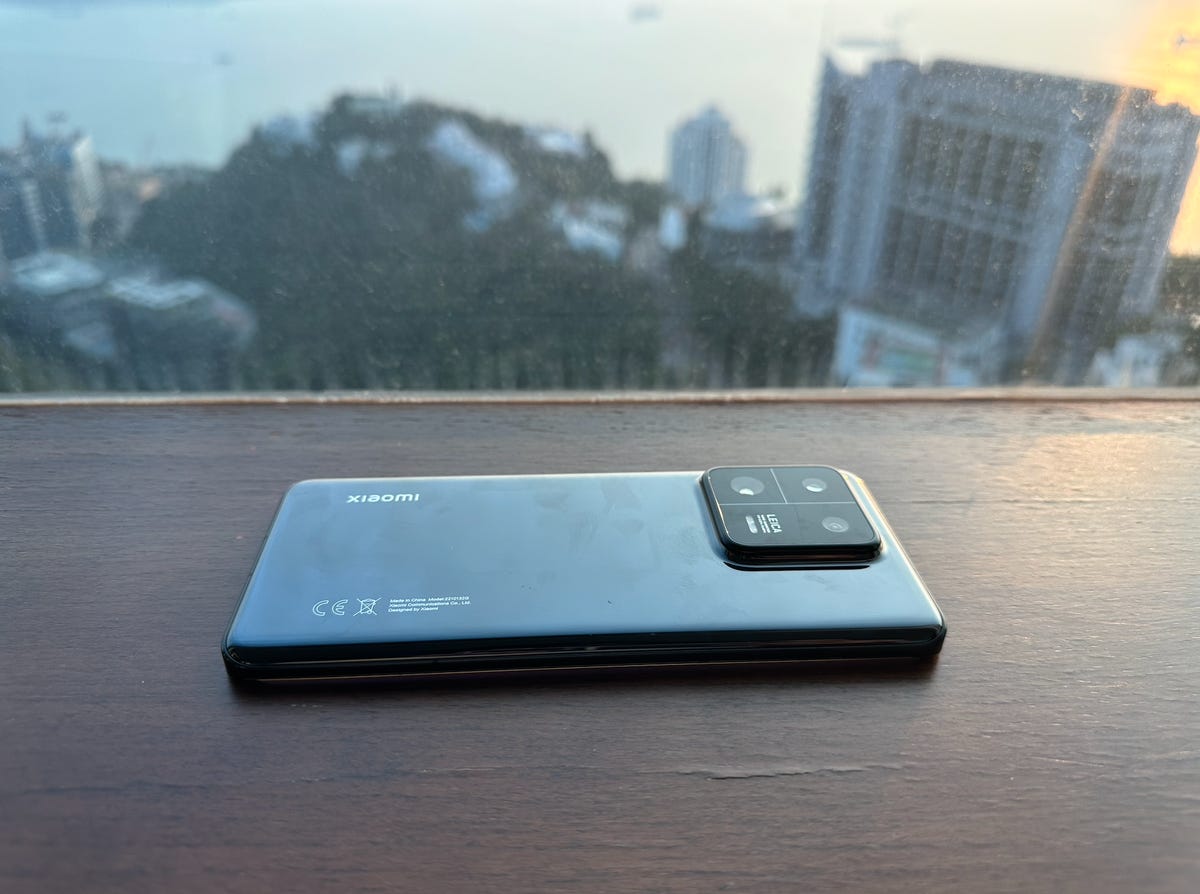Xiaomi has just launched the new Xiaomi 13 flagship lineup that’s poised to compete with Samsung’s Galaxy S23 series. The highest-end phone of the two member series is the Xiaomi 13 Pro. It boasts headline features such as a large 1-inch camera sensor and 120-watt fast charger, which genuinely stunned me by fully replenishing my dead battery within 20 minutes.
Apart from the headline features, there’s a 6.73-inch OLED display with a fast refresh rate, an ultracrisp screen, a solid camera module complete with a telephoto lens and a cutting-edge processor in the form of the Snapdragon 8 Gen Plus 2 chipset. There’s also a large battery backed up by fast charging options including wireless, reverse and that clutch 120-watt wired charger.
I spent a day testing the Xiaomi 13 Pro, which delivers a solid Android experience packed in a sleek device with premium build quality. I’ve always been a fan of fast charging for practical reasons, and once again Xiaomi has delivered the goods with the 13 Pro. The display also stood out to me not only for its responsiveness but also for its sheer clarity and sharpness when I was reading. I’m nearsighted and reading the screen felt easier on my often-strained eyes.
This isn’t a revolutionary upgrade from the Xiaomi 12 Pro, but more of a fine tuning. And Xiaomi seems to have ticked all the key boxes. This year Xiaomi flagships finally secured an official IP rating, for example. The Xiaomi 13 Pro has an IP 68 rating, which means it’s essentially dust- and waterproof. This puts it on par with Samsung’s Galaxy S23 Plus.
The Xiaomi 13 Pro is slated for a global release. However, there’s no current plan for a US rollout. At the time of this writing, there was no pricing information available.


There are a trio of 50-megapixel cameras on the Xiaomi 13 Pro.
Sareena Dayaram/CNETXiaomi 13 Pro has a trio of 50-megapixel cameras
The Xiaomi 13 Pro has three 50-megapixel cameras on its rear, which were co-developed with Leica. This is the first time Xiaomi has partnered with Leica for an international flagship. The device also comes with two photographic styles called Leica Authentic and Leica Vibrant, though I gravitated towards the former since I wanted to see images in their rawest form.
The main camera uses the same 1-inch-type Sony IMX989 sensor found in the Xiaomi 12S Ultra, which means it’s among the largest image sensors found on any phone. It’s also the same sensor found in Sony’s $1,200 point-and-shoot camera, the RX100 VII, and it means the Xiaomi 12S Ultra houses the largest image sensor found on any phone.
However, a word of caution: The phone’s history-making camera hardware isn’t a guarantee of best-in-class photos. As with any other phone, the Xiaomi 13 Pro’s software will play a crucial role as well in determining the image quality of the final photo, though Xiaomi has a solid track record.
That said, I was impressed with the crisp, detail rich photos this camera took, especially in environments with ample light. The main sensor is accompanied by a 50-megapixel telephoto camera complete with an upgraded 3.2x optical zoom and a 50-megapixel ultra-wide with support for macro photography. Take a look at the images taken in all sorts of lighting environments below.


The camera does a wonderful job of capturing contrasts and the vibrant color of this decorative piece.
Sareena Dayaram/CNET

Notice the sharp contrasts in this image
Sareena Dayaram/CNET

This image looks great overall, but wasn’t the most true to life in terms of the shade of yellow of the tofu scramble. It’s a much darker and more saturated yellow than in real life. Compare it with the iPhone 3 Pro Max image below.
Sareena Dayaram/CNET

The iPhone 13 Pro Max does a better job than the Xiaomi 13 Pro of capturing a true to life image. Notice the difference in the shade of yellow from the image above.
Sareena Dayaram/CNET

Taken outdoors on a foggy day.
Sareena Dayaram/CNET

Zoomed in 70x
Sareena Dayaram/CNET

Close up of a flower. Once again, the camera does a wonderful job of capturing a vibrant shot in an environment with ample lighting,
Sareena Dayaram/CNET

Notice the sharp contrasts in this image.
Sareena Dayaram/CNET

The Xiaomi 13 Pro is set to receive a global release.
Sareena Dayaram/CNETXiaomi 13 Pro leads the charge
It’s clear from the specs sheet Xiaomi focused on giving customers options when it comes to charging. There’s a 120-watt charger in the box, which blew me away, even though Xiaomi has always been one of the industry leaders with its fast-charging technology. The charger lived up to the promises, and charged the 4,820-mAh battery within just 20 minutes.
In addition to this spectacularly fast-charging brick, the 13 Pro also offers 50-watt wireless charging support and 10 watts of reverse wireless charging. Xiaomi says not to worry about battery longevity, indicating that its Xiaomi Surge battery management and charging chipsets will offer protection in that area. The company didn’t provide details on how that technology works, however.
Xiaomi 13 Pro’s display and design
The Xiaomi 13 Pro has 3200×1440 resolution sprawled across an 6.73-inch screen, making for an impressive 522 ppi pixel density. It sounds good on paper, but in practice I was genuinely impressed by how clear text and images were displayed. I often find my eyes strained due to using screens a lot and reading a lot, but I somehow found it easier to read text on this display thanks to that flagship worthy resolution, which put less of a strain on my eyes. The display also has a 120Hz refresh rate, making for smooth and seamless navigation between apps and when I scrolled my social media feeds.
For more details on the Xiaomi 13 Pro, take a look at the specs chart below. We’ve also compared its specs with perhaps its biggest Android rival, the Galaxy S23 Plus.
Xiaomi 13 Pro vs. Galaxy S23 Plus
| Xiaomi 13 Pro | Galaxy S23 Plus | |
| Display size, resolution | 6.73-inch AMOLED (3200 x 1440 pixels); 120Hz | 6.6-inch AMOLED; 2,340×1,080 pixels; 120Hz Adaptive Refresh Rate; 1,750 nits |
| Pixel density | 552 ppi | 393 ppi |
| Dimensions (Millimeters) | 162.9 x 74.6 x 8.38 mm | 76.2 x 157.7 x 7.6 mm |
| Weight (Ounces, Grams) | 229g (8.07g) | 196 g (6.91 oz) |
| Mobile software | Android 13 | Android 13 |
| Camera | 50-megapixel (telephoto), 50-megapixel (ultra wide), | 50-megapixel (wide), 12-megapixel (ultrawide), 10-megapixel (telephoto) |
| Front-facing camera | 32-megapixel | 12-megapixel |
| Video capture | 8K | 8K |
| Processor | Qualcomm Snapdragon 8 Gen 2 | Galaxy-optimized Qualcomm Snapdragon 8 Gen 2 |
| RAM/Storage | 12GB + 256GB, 12GB + 512 GB | 8GB + 256GB; 8GB + 512GB |
| Expandable storage | None | None |
| Battery/Charger | 4,820 mAh (120W bundled, 50W wireless charging, ) | 4,700 mAh (45W wired charging) |
| Fingerprint sensor | Side | In-display |
| Connector | USB-C | USB-C |
| Headphone jack | No | No |
| Special features | IP68, 120W bundled charger, 1-inch camera sensor | 5G (mmw/Sub6), IP68 rating, faster wired charging, wireless PowerShare to charge other devices, UWB for finding other devices |
| Price | TBC | $1,000 (8GB/256GB) |
| Price (GBP) | TBC | £1,049 (8GB/256GB) |
| Price (AUD) | TBC | AU$1,649 (8GB/256GB) |


